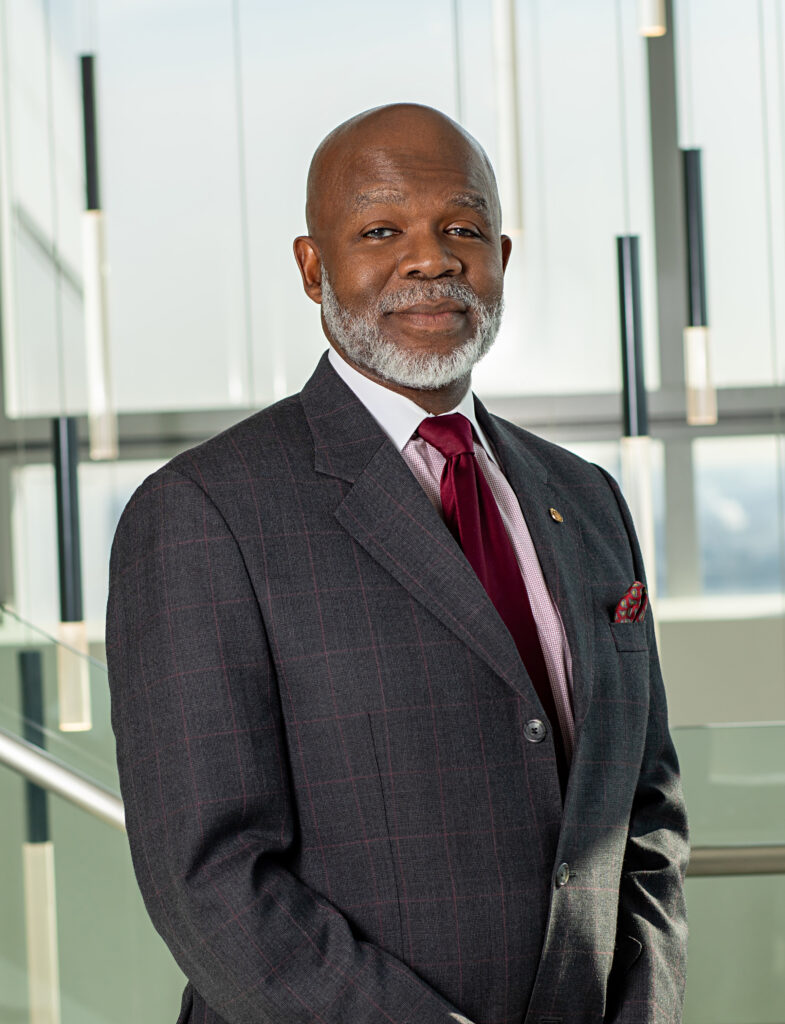Breaking Ground
Mitlon Pratt, Executive Vice President of Development, The Michaels Organization

By Abram Mamet
10 min read

At National Housing & Rehabilitation Association’s 2025 Summer Institute in Boulder, CO, Milton “Milt” Pratt, executive vice president of development at the Michaels Organization, sat down with NH&RA president and CEO Peter Bell to survey Pratt’s extensive career in affordable housing.
The engaging 30-minute discussion (and subsequently vigorous Q&A) covered broad ground but largely focused on the resilience of an industry built on shared knowledge and commitment to service. Pratt emphasized the importance of building intra-industry relationships, particularly during challenging times when deals become more difficult to complete.
“For us, making the investment and being at these types of meetings is critical to our continued growth,” Pratt said, referring to the advantages of consistently attending NH&RA meetings.
Over a nearly 40-year career in affordable housing, Pratt has spent the last 20 years at the Michaels Organization, where he has steered traditional tax credit deals, as well as mixed-finance and disposition deals with municipal housing authorities, growing with a company that now has about 80,000 units across 39 states. Today, Pratt also collaborates with Michaels’s business development arm, assisting some of the younger members of the organization’s 3,000-person-strong employee base in finding success within the affordable housing industry.
At the core of that work, Pratt emphasized care and commitment to the mission of affordable housing: “taking care of families and lifting lives.”
This interview has been edited for length and clarity.
PB: If I recall correctly, you originally set out to become a teacher. Tell us about how you got into the affordable housing business.
MP: My origin story is funny. I don’t think many of us have degrees in affordable housing – I know I don’t. I went to Westchester State Teachers’ College. I didn’t know what I wanted to do.
I started studying to be a teacher and got a job at the library. This was long before you could Google search everything, with all the world’s information at your fingertips. At the time, the university I went to school at was also a government document library. And, as some of you may recall, every day, the federal government printed every single document. And there were entire wings of libraries, mostly at public institutions, where they shipped all that stuff to the institution every day, and somebody—me—unloaded them off the truck, and had to file all of the Code of Federal Regulations (CFR) notices, and all the notices that Treasury put out, and HUD.
So I got to understand what the CFR was, and I went on an interview as an intern right after I got out of school, and I sat down at my boss’s desk, and he was so impressed that I knew what the CFR was and how to use it that he said, “you’re hired, kid.”
That’s how I got into housing, working for the Borough of Norristown, PA, in their community development and planning office. And because I was an intern, my plan was to stay there for the summer and go back to graduate school. But I ran out of money and decided that I’d better get a real job.
I realized that “hey, this isn’t bad stuff, working in community development.” And at the end of the summer, Richard Schmoyer (the office’s director) asked me what I was going to do. I told him I was going to work for Wawa (the convenience chain) because I didn’t have anything else to do. He said they had some Community Development Block Grant (CDBG) money, and they wanted me to start working in slum and blight programs, going out with the code enforcement officer every day and a health inspector, spending time learning and absorbing how to get code enforcement done, and figuring out how to do safety inspections.
That was my entrée into the world of housing.
PB: And then, from there, you moved into work with housing authorities, correct?
MP: Yes, I eventually got a real job with the Philadelphia Housing Authority. And my boss at the time hired me to do all the utilization reports for the old Section 8 Moderate Rehabilitation (Mod Rehab) program, which predated today’s voucher program. My boss said, “Your job is to do the utilization reports and figure out how to keep this Section 8 Mod Rehab program working.”
I got to interact with developers like Michaels, Pennrose, and a bunch of nonprofits in Philadelphia. This was in ‘88, right before the real Low Income Housing Tax Credit (LIHTC) program got going. So, I was the kid underwriting all their deals and supporting their mortgages with rent increases, and I did the initial underwriting to establish the rents.
It gave me great exposure to working with developers. And I always said, “One day when I grow up, I want to be a developer.”
That was my inspiration. Later, I worked for National Equity Fund (NEF). Back then, they were thinking about being a developer. And they took on a large public housing transaction, and one day, my boss called me and said, “Hey, not only are we going to be the equity investor, we’re going to be the developer. I said, “Oh, wow. Who’s going to do that?” He said, “You are.”
That was my first foray into being a developer.
Eventually, I went back into government. I was appointed the Mid-Atlantic regional director for the Department of Housing and Urban Development by George W. Bush. I remember one of my mentors, former Philadelphia Mayor Wilson Goode, saying, “Young man, you are going to go into this job knowing a few 1,000 people. You’re going to come out knowing 10,000 people. Always remember to make friends and try to influence people to make good decisions.”
I had a great time at HUD. And when I left, Bob Greer—another NH&RA member—was recruiting me to Michaels. And the rest is history. I came to Michaels and have enjoyed all the rewards of being at a great family organization, while at the same time being able to do good work all across the country with many cities, counties, and housing authorities.
PB: Michaels, to me, has always seemed like a company that looks to tackle some of our industry’s most challenging jobs. For example, you have made a big investment in New Orleans over the years and have done a lot of public housing redevelopments. Why do you pursue such difficult jobs, and what makes those jobs work?
MP: What makes difficult jobs work is the great people that we have at the organization.
Even though I’m a developer, I recognize that taking care of the families that we serve is our primary business, whether it’s low-income housing families and seniors, soldiers and sailors, or a young person going off to live at college, and it’s their first time being away from home. For us, it is taking care of families and lifting lives.
PB: After years of partnering with public agencies, you’re focusing on partnerships with corporate entities, like healthcare institutions, for workforce housing. What kinds of innovations are you seeing?
MP: Every time I go into a town and talk to them about what’s going on, they say, “We know how to do the affordable housing stuff, and there’s plenty of market-rate housing here, but our essential function workers don’t have anywhere to live. And if you could help us with that problem, that would be a lifesaver for our community.”
Now, we’re doing projects with Disney, we did a deal with the Louisiana State University healthcare systems in New Orleans, primarily focused on housing teaching faculty and staff, and we’re also doing a project with Tampa General Hospital.
We’ve started to focus on the healthcare side of the business. I’m talking to CEOs of hospitals more often than I’m talking to housing authorities or planning directors, because every time I talk with one, they say, “We have this huge problem. We have excess land, but we don’t have any capital.”
In our view, if we can get real estate tax-exempt, low-cost land, that can make a project work. We really aren’t trying to take the rent from, say, 120 down to 30 or 40 percent area median income (AMI). We’re trying to take it from 120 down to 80 or 90 percent AMI. You don’t need $10 million of soft funds to do that. What you need is low-cost land with a real estate tax exemption and maybe some waiving of impact fees or some other support from the local jurisdiction to make that project work.
PB: What are some challenges that you see in the affordable housing industry today?
MP: We all came to this business to do good. In our case, we like to say that, “We lift lives everywhere we work.” But at the same time, we’ve got to be profitable as an industry, whether we are a nonprofit organization or a for-profit. And I think it’s getting more difficult to be profitable long term if you’re only doing affordable housing. These deals are getting tougher to get done, and they’re getting smaller.
Our reality is that we have to find ways to diversify as an organization. That’s critical.
PB: What advice do you have for young people getting started in this business?
MP: Get to know people. Get out in the industry. We have to find ways to get younger people to these conferences. Getting in a room and talking about the work we do is tremendously valuable.
It comes down to relationships. If I have a problem somewhere, I may not know somebody there, but I do know somebody who might know somebody else. Solving problems is where I spend a lot of time, and it’s because I have great relationships in the market and can call on friends, many of whom are NH&RA members.
PB: What value do you see in your involvement in organizations like NH&RA, both in terms of financial investment and time spent in person at conferences?
MP: I always say, “Meet one new person, learn one new thing.” I also have access to other industry leaders when I have a problem.
For us, making the investment and being at these meetings is critical to our continued growth. The portfolios that we’ve purchased over the years, many of them have been purchased from members here, members that we spoke to about our opportunity and desire to build or buy more units.
It’s really about business growth and giving us opportunities for future development. We partner with a number of you on the financial and legal sides. Meeting with a new development partner or a new lender who has a new product, I take this information and…share it with our developers.
It’s all about networking and the relationships that get built from these industry associations.

